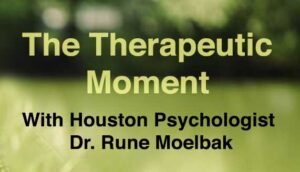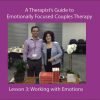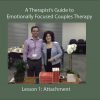Why is My Partner Always Angry or Unhappy with Me?
Do you know the sinking feeling that comes when you generally feel happy and satisfied with your relationship, but your partner frequently expresses feeling unhappy or unfulfilled? If you are like most people you might feel discouraged or start to doubt your own worth as a partner, spouse, lover, or person. You might wonder “why am I not cutting it?” I am a decent person with no malice or bad intentions. Is there something wrong with my natural instincts? Is my natural self just not likable or lovable? Do I have some inherent deficiencies that inherently makes me unable to please my partner or make my partner feel loved?
In this article we will explore how address this concerning state of affairs by looking both at what works and what only makes it worse...
3 Solutions that Will Only Make Things Worse:
The kind of shame-based feelings mentioned above are all too common. They can lead to any number of strategies that can serve to protect your honor, your relationship, or your self-esteem:
The Turtle Strategy:
I can feel down about myself and become more withdrawn and shut down. This is like the strategy of a turtle who seeks to pulls its head into its shell so as to protect itself from further criticism and shame. In the short term it keeps me safer and protects my self-esteem, but only because I keep some distance to my partner and keep a lot of thoughts, feelings, and impulses out of sight and to myself. Ultimately the turtle strategy is like going on hunger strike. I hurt myself in the process of not wanting to be hurt. I suck the air out of the relationship but forget that I need the air to be there in order to breathe.
The Chameleon Strategy:
I can try to change myself by saying what my partner wants to hear or apologizing and agreeing with their criticisms of me or I can let my partner turn a project out of me and gradually try to become who they want me to be. This may seem to keep the peace, but at what price? It is true that it is harder for my partner to dislike me if I mold myself to their expectations, but if I am not free to be myself who do they really love? A power struggle around this issue seems to have ensued between Mike and Natalie in 90 Day Fiance. Natalie wants Mike to change for her by becoming a vegetarian, not drinking, and adopting a religion he does not believe in. Mike quickly discovers that there is peace when he goes along, but he also ends up feeling unloved for who he really is. Becoming a chameleon for someone else inevitably falters not only because a dog can never become a cat, but also because nobody really wants to be in a relationship with a puppet. Whenever I try to mold myself to someone else's image of who they want me to be, I am inevitably going to go along in a half-hearted disingenuous way. Eventually my partner will notice that I only seem to be "going along to get along" and will criticize me for this as well. As Jennifer Aniston says to Vince Vaughn in the movie The Break Up, "I don't want you to do the dishes I want you to want to do the dishes". The chameleon strategy therefore ultimately doesn't work because true desire comes from within and cannot be accomplished through the half-hearted disingenuous attempt to be what you are not.
The Warrior Strategy:
I can get angry because I don’t feel loved for who I am and don’t agree with my partner’s negative image of me. I can try to convince them they are wrong, invalidate their reactions by calling them irrational, or turn their criticism back on themselves by making them feel that they are “too difficult to be with”. Ultimately I might win this war by making my partner feel bad enough about their feelings that they end up going along with the status quo. While this can seem like a win at first, it rarely ever works because it is simply based on my partner suppressing their feelings and needs and will eventually starve them out of their love for me.
So if None of These Strategies Work, What Am I to Do?
The first step might be to realize that my partner’s unhappiness and dissatisfaction with the relationship is a symptom not of my deficiencies but of their unmet needs. This kind of reframe immediately makes the situation less threatening because it makes it less of a zero-sum game.
Relationships are Not a Zero-Sum Game:
In relationships we often get into the mindset of thinking about feelings as a zero-sum game. If my partner is unhappy with me, it must mean that I as a person am making them unhappy. However, if I think this way I have no option but to deploy one of the strategies mentioned above. I can withdraw, change myself, or fight, but now either I or my partner becomes the loser.
A better way to think about it is as a win-win situation. If I can understand what is fueling my partner’s dissatisfaction not as something wrong with me, but as a normal desire to feel more connected, then I might be able to respond to their need simply as if they were saying "I am hungry. will you feed me?"
And indeed much of the time when my partner expresses criticism and seems unhappy with me, they might as well be saying: I am feeling disconnected, unimportant, unsure of your love for me, or worried that we are drifting apart. Their concern which might be expressed as a criticism of me, is oftentimes really a desire for more closeness and connection.
If I understand that my partner's criticisms and demands are simply reactions to an underlying need to feel reassured of my love and commitment or to feel close to me, I can respond to this need instead of make it about my own deficiencies.
Why Does My Partner Get Angry or Critical?
So if my partner is really having a desire for closeness and reassurance why do they get angry with me or push me away?
This is where we need a biological explanation...
You see when people feel disconnected, alone, or uncertain about their relationship, it can trigger a very primal fear in us of losing our attachment to the other person. The fear which is wired into us as a way to protect us from harm makes us see the other person as withholding, “cold”, uncaring, uninterested, or non-committed. For a moment our fear and our need for self-protection turns our partner into the "enemy" or the source of our fear. It doesn’t matter in that moment that this is not case. It feels like it is the case, and for that reason we may lash out with anger, criticism, or contempt. Unfortunately this barrage of strong adversarial feelings pushes the other person away rather than brings them close. They cause a defensive response and this response only cements our partner's view that we are uncaring, withholding, or uninterested.
The Counter-Intuitive Approach to Making My Partner Happy:
So here is the punchline. If instead of seeing rejection in my partner's anger, and instead see a longing to connect with me, and a scared frightened partner who is afraid of losing me, I might be able to come close, reaffirm my partner's importance to me, and reveal my own fears and longings, which will make my partner feel they are not alone. In that moment I can then cease to be a turtle, a chameleon, or a warrior, and I can instead become my most honest vulnerable self. Although my partner might not know that this is really what they have been longing for, it will likely restore their sense of connection to me, and make them instantaneously happy with me.
This perhaps counter-intuitive approach to responding to my partner's criticisms, blame, and anger, can be be difficult to muster, but if I can succeed, I will ultimately succeed in setting my relationship back on a path to success.


























16 Responses